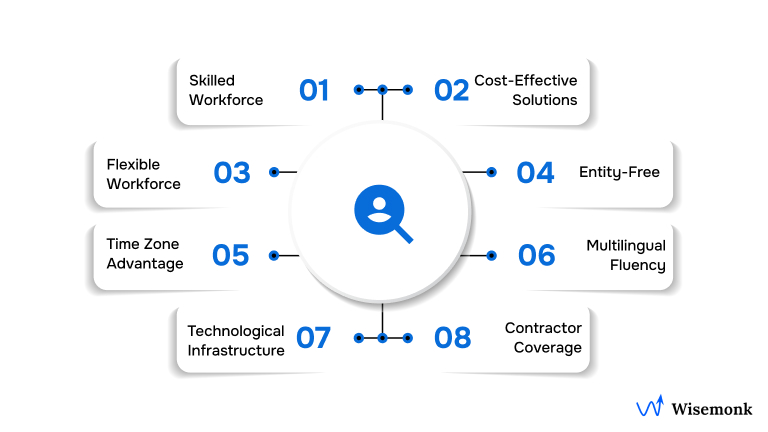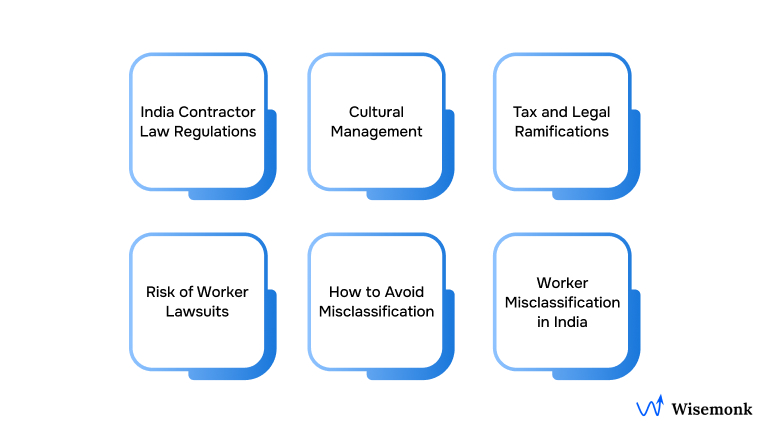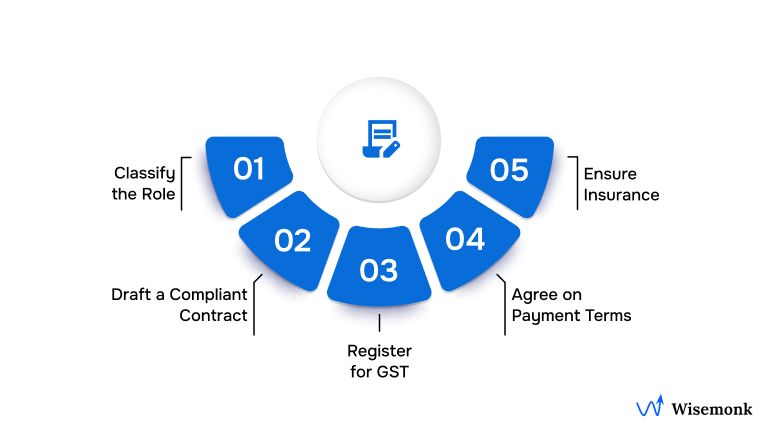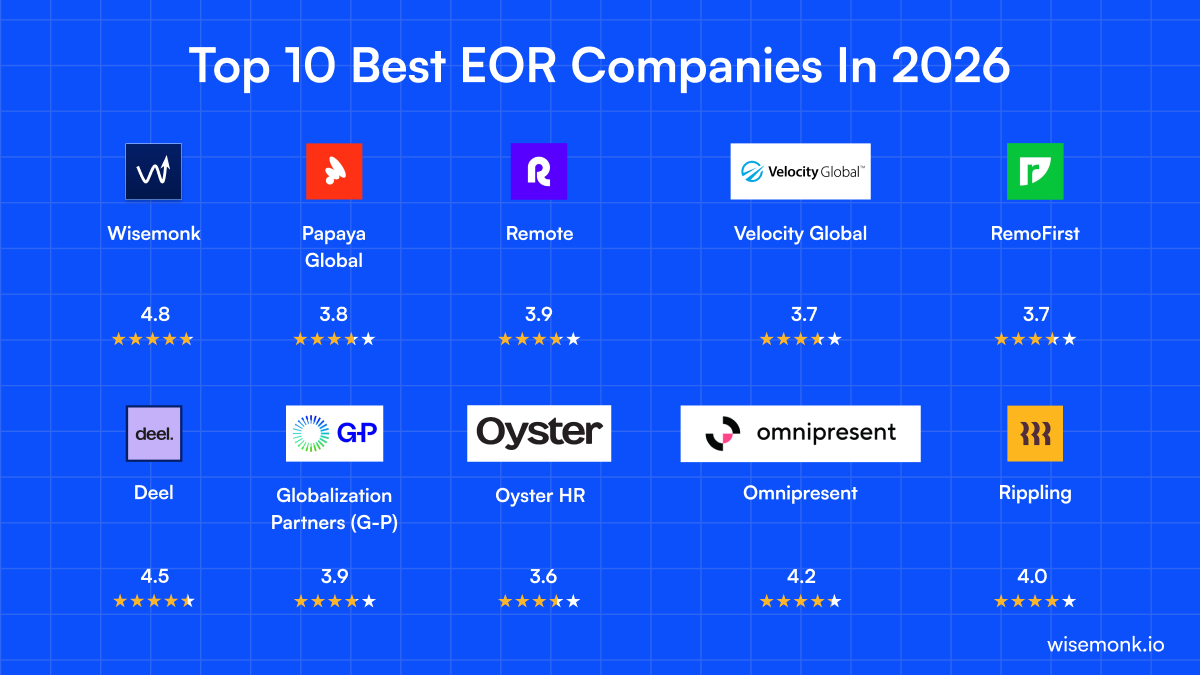- Independent contractors in India operate as self-employed individuals under contract, managing their own taxes, insurance, and payments.
- Clear contracts defining work scope, payment terms, and tax responsibilities are essential to avoid misclassification and legal risks.
- Common payment methods include bank transfers, UPI, digital wallets, and platforms like PayPal or Payoneer for international transactions.
- Contractors must comply with GST registration if turnover exceeds ₹20 lakh, file income tax returns, and clients may deduct TDS on payments.
- Using platforms like Wisemonk can simplify contract management, payments, taxes, and insurance for contractors and clients alike.
Independent contractor payments in India can feel complex. Understanding your payment structure, tax responsibilities, and insurance needs is crucial to secure timely, fair compensation and protect your income.
This guide cuts through the noise, helping you manage contracts, payments, and compliance with confidence.
Who is an Independent Contractor?
An independent contractor in India is a self-employed individual who offers services under contract terms without being an employee. They have autonomy over how and when work is done and manage their own taxes, expenses, and insurance.
The Indian Contract Act, 1872, governs these agreements, ensuring contracts are legally enforceable.
Why Hiring Contractors in India Makes Sense
India offers a skilled and cost-effective talent pool, particularly in sectors such as IT, design, finance, and creative services. You can hire contractors without setting up a local entity, saving costs and paperwork.

Additionally, India's time zone advantage, English proficiency, and solid tech infrastructure enable smooth remote collaboration.
Contractor vs Employee: Key Differences
Misclassifying workers can lead to heavy penalties, so clear contracts and roles are essential.
Legal Framework for Independent Contractors in India

Contractors comply with:
- Indian Contract Act, 1872: Governs contract enforcement.
- Income Tax Act, 1961: Contractors file their own income tax returns.
- GST Act, 2017: Registration is required if turnover exceeds the threshold (usually ₹20 lakh).
India’s new labor codes also impact compliance, streamlining many existing laws while largely excluding contractors from traditional employee protections.
Independent Contractor Insurance
Insurance helps manage risks related to contractual disputes or non-payment. While not mandatory, having contractor insurance is strongly recommended to protect your income and limit liability.
Hiring Contractors in India: Best Practices

- Classify roles clearly: Confirm contractor status to avoid misclassification penalties.
- Draft clear contracts: Define scope, deadlines, payment terms, tax responsibilities, insurance requirements, IP rights, termination clauses, and dispute resolution.
- Agree on payment methods: Bank transfers, UPI, digital wallets (Paytm, Google Pay), PayPal, Payoneer, or platforms like Wisemonk.
- Ensure tax compliance: Educate contractors on TDS, GST, and income tax filing.
Payment Methods for Contractors in India
Payroll platforms like Wisemonk can manage payments, taxes, insurance, and compliance on your behalf, reducing risks.
Taxation Overview for Independent Contractors
As an independent contractor in India, understanding your tax obligations, including income tax, GST, and TDS, is crucial to staying compliant and managing your finances effectively.
GST
Contractors with turnover > ₹20 lakh must register for GST (typically 18% on services). GST returns must be filed on a monthly or quarterly basis.
Income Tax
Contractors file their own returns (ITR-3), paying income tax as per slabs. Advance tax payments are due if tax liability exceeds ₹10,000 annually.
TDS (Tax Deducted at Source)
Clients may withhold TDS between 1% and 10% on payments to contractors.
Managing Taxes for US Clients Hiring Indian Contractors
- IRS Form 1099-NEC: US companies must file if payments exceed $600.
- Form W-8BEN: Filled by contractors to certify non-US residency.
- DTAA Benefits: Double Tax Avoidance Agreement prevents double taxation.
Setting Your Contractor Rates
Consider:
- Cost of living and market rates in India.
- Skills, experience, and demand.
- Project complexity and client budget.
- Competitor pricing in your niche.
A practical rate covers your expenses, taxes, insurance, and desired income. Calculate by dividing annual income goals by billable hours, including overhead and contingencies.
How to Invoice and Get Paid
Knowing how to create and send a clear, professional invoice is key to getting paid on time and keeping your contracting business running smoothly.
Professional Invoice Essentials:
- Unique invoice number and issue date.
- Client and your business details.
- Service descriptions with quantity and rates.
- Total due, including applicable taxes.
- Payment terms (Net 15/30) and penalties for late payment.
- Payment instructions (bank details, UPI ID, or payment link).
Tips:
- Submit invoices promptly.
- Track payments using software like QuickBooks or Wisemonk.
- Handle currency conversions transparently with platforms like Wise.
Handling Disputes and Non-Payment
Handling disputes and non-payment requires a straightforward, professional approach that prioritizes effective communication, documented agreements, and utilizes methods such as mediation or arbitration to protect your rights and income.
Prevention:
- Detailed contracts with clear terms.
- Regular communication and documentation.
- Proactive management of expectations.
If Needed:
- Send formal demand letters.
- Pursue mediation or arbitration.
- File claims in small claims court for smaller amounts.
Contract Termination and Extension
- Include notice periods and termination clauses.
- Clarify payments for completed work and deliverables.
- Update insurance coverage if contracts extend.
- Outline terms for contract renewal or end.
Transitioning a Contractor to a Full-Time Employee
If a contractor becomes critical to your business:
- Draft an employment agreement with salary and benefits.
- Shift tax and insurance responsibilities.
- Set up payroll and withholdings (PF, ESI).
- Respect employment laws and benefits.
How Wisemonk Simplifies Contractor Management
Wisemonk streamlines contractor management with its comprehensive platform, offering:
- Compliant Contract Drafting: Ensures legally sound and compliant agreements.
- Flexible Payment Management: Supports multiple payment options for seamless transactions.
- Tax and GST Compliance: Tracks and ensures adherence to tax regulations and GST requirements.
- Independent Contractor Insurance: Provides essential insurance support for added protection.
- Dispute Resolution: Offers resources to manage and resolve conflicts effectively.
Explore more on Wisemonk’s website
Summary Checklist for Contractors
- Ensure role classification and compliant contracts.
- Set clear payment schedules and terms.
- Choose secure, convenient payment methods.
- Stay compliant with GST, income tax, and TDS.
- Maintain or recommend independent contractor insurance.
- Track invoices and payments diligently.
- Prepare for dispute resolution if needed.
- Plan contract termination or extension clauses.
- Understand transition rules if converting to full-time staff.
Being an independent contractor in India comes with rewards and responsibilities.
Understanding your rights regarding payment, insurance, taxes, and contracts is crucial to protecting your livelihood and establishing a sustainable freelance career. With the right tools and knowledge, like those Wisemonk provides, you can simplify compliance and focus on delivering your best work.
If you want a detailed demo or help managing contractors effectively, Wisemonk’s experts are ready to guide you every step of the way.
Frequently asked questions
What’s the difference between an independent contractor and an employee in India?
Contractors work autonomously on projects without employee benefits; employees, on the other hand, have set hours, benefits, and work that is employer-controlled.
Do I need to register for GST as an independent contractor?
Yes, if your annual turnover exceeds ₹20 lakh, GST registration and filing are mandatory.
How do I protect myself from payment delays or disputes?
Use clear, written contracts that outline payment terms and deadlines, submit professional invoices promptly, and maintain documented communication.
Can international clients easily pay Indian contractors?
Yes, through digital payment platforms like PayPal, Payoneer, or international wire transfers, considering currency conversion and tax compliance.
How to pay a contractor in India from the USA?
You can pay Indian contractors using platforms like PayPal or Wise for quick transfers. For larger amounts, bank wire transfers are an option but often costlier. If managing multiple contractors, tools like Deel or Payoneer simplify payments and compliance.
Can you pay an independent contractor a salary?
No, independent contractors are not paid a salary. They are typically paid per project, task, or hourly, since receiving a regular wage is a key factor the IRS uses to classify someone as an employee instead of a contractor.
How to accept payments as a contractor?
Contractors can receive payments through direct deposit, checks, domestic wire transfers, or digital apps like PayPal. The best method depends on client location, fees, and convenience.

.png)
%20(1).webp)
